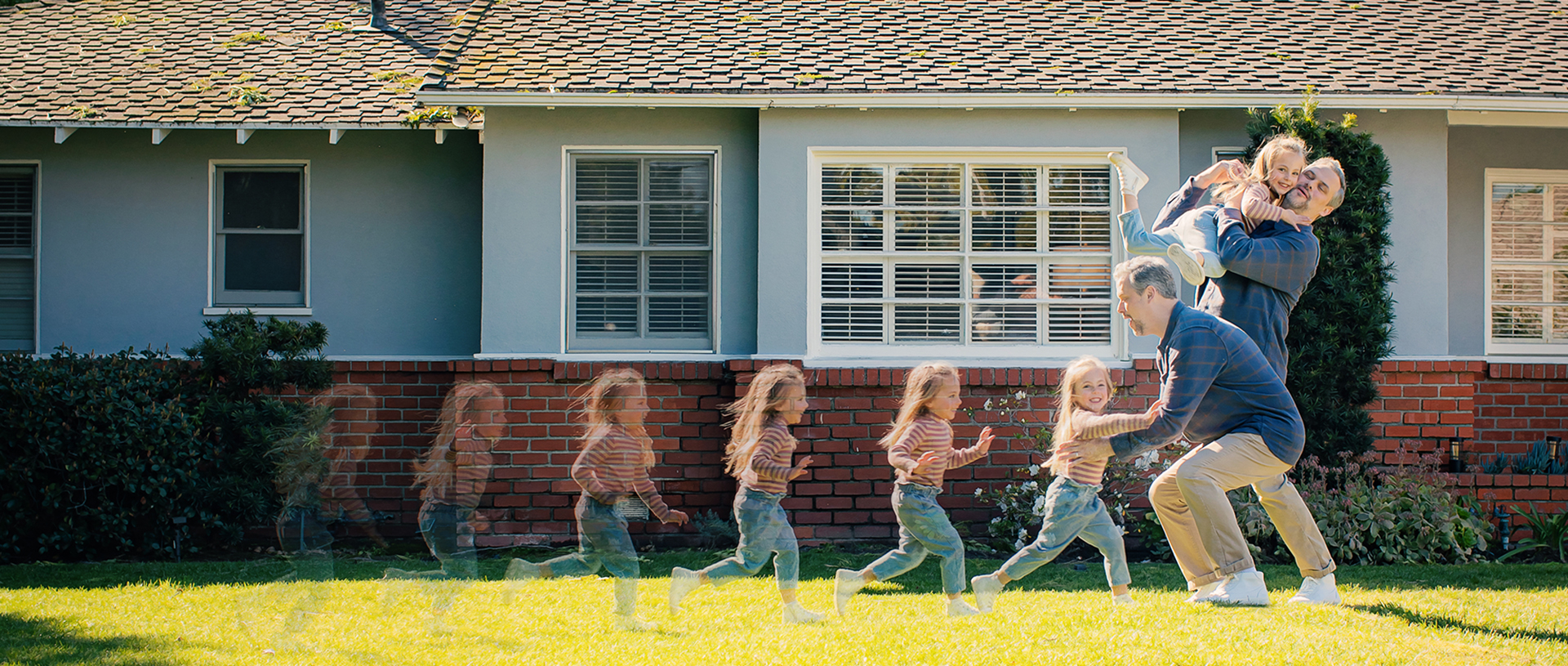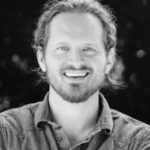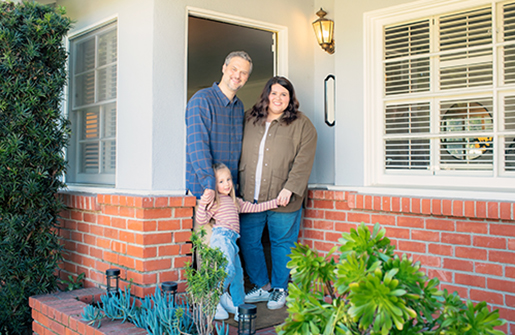
It was Christmastime, 2017, and Eric VanValin (current MSMFT student) was at church, wrangling the kids he served as a volunteer as they waited in the wings for their holiday performance. But just before it was time to lead the kids on stage, Eric’s phone rang and his wife, Dana, had news—the Department of Children and Family Services had called about a child who needed a home. They had been approved as foster parents just days before, and this was the placement they’d been waiting for. “This is wild, but I have to step out,” Eric told another volunteer, and he and Dana made the decision to receive the placement. “You only have whatever information you can get in a ten-minute call,” he says. “And you just both have to have peace about it at that moment, and you say yes.”
Later that evening, when two social workers brought the child to the VanValin home, Eric instantly became a parent. “From that moment, you are fully responsible for this child,” he says. He’d never changed a diaper before, but in no time, he’d changed a dozen. Beyond getting the hang of practical caregiving, Eric was also suddenly thrust into the profound emotions of parenthood—but with added complexity. “A bond is formed very quickly, where you’re feeling all the love and wonder of life, and it’s amazing,” he says. “In the same instance, there is a family that has experienced trauma and what may be the worst moment of their life. There’s a child that’s not in their care. So you are immediately trying to hold both of those realities.”
Eric’s journey to becoming a foster parent had begun several years earlier, when he moved from what he called his “safe Christian bubble” in Virginia to California to pursue a career in the TV industry. “We were moving to an area where not everyone is like us or thinks the same things as us,” he says. Thus, the VanValins arrived in LA with an intentional “posture of learning and listening.” That was in 2014, in the months following the killing of Michael Brown in Ferguson, Missouri. In his new environment, Eric noticed “a national awareness of events that I hadn’t seen before as a White guy who lived in predominantly White spaces.” As he opened himself up to these realities, he was also influenced by the people he interacted with in LA, folks who came from many different backgrounds and walks of life, and found himself entering into a season of reflection—a time of “renewing my mind,” he says. As part of that, Eric attended a lecture series at Fuller where he was impacted by talks from Christena Cleveland and Michael McBride, both of whom urged participants to get involved in resisting the systemic inequity in the US, offering suggestions for practical ways to do so. These talks planted a seed in Eric as he started to think about folks who don’t have “the same support systems or safety nets that I have.”

Joy Netanya Thompson (MAT ’12) is Fuller’s editorial director and senior writer. Find more of her work at joynetanyathompson.com.

Nate Harrison is director of creative production, video, and photography at FULLER studio. Find more of his work at natecharrison.com.
It was Christmastime, 2017, and Eric VanValin (current MSMFT student) was at church, wrangling the kids he served as a volunteer as they waited in the wings for their holiday performance. But just before it was time to lead the kids on stage, Eric’s phone rang and his wife, Dana, had news—the Department of Children and Family Services had called about a child who needed a home. They had been approved as foster parents just days before, and this was the placement they’d been waiting for. “This is wild, but I have to step out,” Eric told another volunteer, and he and Dana made the decision to receive the placement. “You only have whatever information you can get in a ten-minute call,” he says. “And you just both have to have peace about it at that moment, and you say yes.”
Later that evening, when two social workers brought the child to the VanValin home, Eric instantly became a parent. “From that moment, you are fully responsible for this child,” he says. He’d never changed a diaper before, but in no time, he’d changed a dozen. Beyond getting the hang of practical caregiving, Eric was also suddenly thrust into the profound emotions of parenthood—but with added complexity. “A bond is formed very quickly, where you’re feeling all the love and wonder of life, and it’s amazing,” he says. “In the same instance, there is a family that has experienced trauma and what may be the worst moment of their life. There’s a child that’s not in their care. So you are immediately trying to hold both of those realities.”
Eric’s journey to becoming a foster parent had begun several years earlier, when he moved from what he called his “safe Christian bubble” in Virginia to California to pursue a career in the TV industry. “We were moving to an area where not everyone is like us or thinks the same things as us,” he says. Thus, the VanValins arrived in LA with an intentional “posture of learning and listening.” That was in 2014, in the months following the killing of Michael Brown in Ferguson, Missouri. In his new environment, Eric noticed “a national awareness of events that I hadn’t seen before as a White guy who lived in predominantly White spaces.” As he opened himself up to these realities, he was also influenced by the people he interacted with in LA, folks who came from many different backgrounds and walks of life, and found himself entering into a season of reflection—a time of “renewing my mind,” he says. As part of that, Eric attended a lecture series at Fuller where he was impacted by talks from Christena Cleveland and Michael McBride, both of whom urged participants to get involved in resisting the systemic inequity in the US, offering suggestions for practical ways to do so. These talks planted a seed in Eric as he started to think about folks who don’t have “the same support systems or safety nets that I have.”
Joy Netanya Thompson (MAT ’12) is Fuller’s editorial director and senior writer. Find more of her work at joynetanyathompson.com.
Nate Harrison is director of creative production, video, and photography at FULLER studio. Find more of his work at natecharrison.com.


The issue became practical, rather than conceptual, when a group of siblings Eric knew from a youth center where he volunteered lost their father and sole caregiver. The center’s volunteers came together to discuss how to help the kids and where they might be able to live. While the siblings ended up being able to live with a relative, the situation made Eric face the question: what happens to kids when they don’t have a safety net? He knew of the foster system, but he didn’t know much about the ins and outs. “I’d had this shifting mindset over the past three or four years, and I felt it was eventually going to lead to doing something to help others,” he recalls, “but I didn’t know what that specific thing was until we learned about being foster parents.”
The VanValins had been married for more than a decade and had no biological children but shared a desire to have a family. They decided together to look into becoming foster parents, and the more they researched, the more sure they became that it was the path for them. “Dana and I were on the same page, like, ‘Oh, this is how we’re going to start a family,’” Eric says. There was fear, too. “You know this is going to be a challenging endeavor, that children enter the foster care system because of a traumatic event or tragedy.” At the same time, Eric remembers, “we were also learning the importance of attachment and how being a safe, loving attachment figure can help a child.”
“The stakes were so great,” he says, but every step of the way toward becoming certified as foster parents, Eric and Dana felt “almost what you’d call a holy momentum—that feeling that we had to try, we had to at least see if it was possible.” That pull for Eric was directly related to the sense of urgency he’d had since arriving in LA and opening his eyes to the need around him, the “renewing of his mind,” as he referred to it. Becoming a foster family would be “our action, our doing—the orthopraxy that didn’t exist before.”
By 2019, the couple had received another placement and had two children in their care. While they both worked full-time, they realized that two children in their home at any given time would be their limit as a family. But they wanted to find a way to partner with the foster care system in the long term, regardless of how many placements they could host. “By that time we had gotten this education by experience—how to find an agency, how to become a foster parent, how to maintain healthy relationships with the birth family, even practical things like how to prepare your home,” he says. “We realized it would have been great if we had someone like us at the start to guide us through our journey.” That realization turned into an idea to start a nonprofit organization, Our Open House.


Through their nonprofit, the couple mentors individuals and couples who are investigating or on their way to becoming foster families. They also offer practical assistance like providing car seats, cribs, and other necessities to help families prepare their homes for placements. They’ve even partnered with their local child and family services department, directly connecting with social workers who inform them of needs among foster kids and families. “We’ve been able to guide several families through the process who are now foster parents,” says Eric. “Our Open House is also bringing awareness about the foster care system to people like Dana and me, who had the capacity and the desire but didn’t exactly know how the system worked.”
The more Eric spent time partnering with the foster system and supporting families, as well as caring for the children placed in his home, the more he wanted to do. He was also teaching a marriage class at church with Dana, a ministry the couple had found rewarding for the past several years. Even though Eric enjoyed his career in television, he found himself wondering, “How is there a way that I could have my professional life match what I’m doing in every other area of my life?” Even more, he wanted to deepen his knowledge and expertise so that he could “help people and help families more, and better, than I currently am.” This desire led him to Fuller’s MS in Marriage and Family Therapy program, in which he is currently enrolled.
“Being a licensed marriage and family therapist is something I could see myself wanting to do for the rest of my life, having my life’s work be around working with families and hopefully providing a safe place for children to develop and grow,” says Eric. And since starting his program more than a year ago, he’s become aware of a direction he might take his career in: specializing in adoption and permanency. “That’s an area of therapy I didn’t know existed before this program,” he says. “There are certain issues that come up once you’ve adopted, and having someone who understands that, who can help prepare families and also work with them as they’re experiencing it, is a huge benefit.” Eric and Dana know about the unique needs of adoptive parents firsthand, since adopting their daughter, Audrey, in 2022.
From knowing very little about the system to now mentoring others and even pursuing a career that supports his calling, Eric has come a long way since that first placement in 2017. “At the beginning of being a foster parent, you are on this roller coaster where you’re feeling the most extreme highs, the most extreme lows, sometimes in the same day,” says Eric. “But then the more you do it, the better you are at managing that and understanding that it’s a long journey.” That journey has been full of twists and turns he couldn’t have anticipated. “There are constant surprises,” he says. “Surprise at how hard it is, and surprise that you can do it, and also surprise at how wonderful it is. You’re surprised at how alive you feel in these very routine, mundane moments of diapers and bottles, how you are experiencing everything life has to offer in those moments.” Another surprise has been Eric’s expanding definition of family as he and Dana navigate maintaining ties with the child who was first placed with them and was reunified with their family after more than a year. “It’s understood that you love your family unconditionally. But foster care has taught me to love others outside of my family unconditionally, in the way that God loves everyone equally, unconditionally, without question,” he says. “It has broadened my perspective of whom I have the capacity to love. It has totally transformed my understanding of family.”
Since Eric moved to Los Angeles with an open mind and heart, he experienced several major transformations: becoming a father, becoming the cofounder of a nonprofit, and even making a dramatic change to his career trajectory. And, while it’s not what he expected when he moved to LA to advance his career in the entertainment industry, Eric is sure this is the right path for him, with all its highs and lows. “It became clear to me very early on: if my life is spent helping a handful of children develop attachment well and being a safe place that sets them up for that—that’s a life well lived.”
As they pastor in a diverse Hong Kong neighborhood, Ebson Simick (MDiv ’16) and Tryfina Phipon (MDiv ’16) testify to the beautiful ways God works across the many relationships we have with one another.